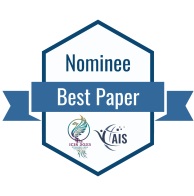Loading...
Paper Number
2450
Paper Type
Completed
Description
Grounded on an experimental study with 18 participants, we derive 15 design principles for no-code AR authoring tools in an organizational setting. The study consists of two distinct treatments that aim to augment lightweight processes with AR. The outcomes are two interactive tutorials utilizing AR instructions. Following the no-code approach, the participants were empowered to create relevant AR content using a reduced interface and no need for advanced configurations or coding. The study thus combines two research streams with the aim of better understanding mechanisms for AR use in a professional context. As prior work has shown, despite the potential benefits, the adoption of AR authoring tools is limited because ramping up AR to productive use is heavily dependent on consulting and custom software solutions. Our novel approach bears the potential to broaden application domains and empower professionals to apply AR.
Recommended Citation
Bräker, Julia; Hertel, Julia; and Semmann, Martin, "Empowering Users to Create Augmented Reality-Based Solutions – Deriving Design Principles for No-Code AR Authoring Tools" (2023). ICIS 2023 Proceedings. 14.
https://aisel.aisnet.org/icis2023/generalis/generalis/14
Empowering Users to Create Augmented Reality-Based Solutions – Deriving Design Principles for No-Code AR Authoring Tools
Grounded on an experimental study with 18 participants, we derive 15 design principles for no-code AR authoring tools in an organizational setting. The study consists of two distinct treatments that aim to augment lightweight processes with AR. The outcomes are two interactive tutorials utilizing AR instructions. Following the no-code approach, the participants were empowered to create relevant AR content using a reduced interface and no need for advanced configurations or coding. The study thus combines two research streams with the aim of better understanding mechanisms for AR use in a professional context. As prior work has shown, despite the potential benefits, the adoption of AR authoring tools is limited because ramping up AR to productive use is heavily dependent on consulting and custom software solutions. Our novel approach bears the potential to broaden application domains and empower professionals to apply AR.
When commenting on articles, please be friendly, welcoming, respectful and abide by the AIS eLibrary Discussion Thread Code of Conduct posted here.




Comments
02-General